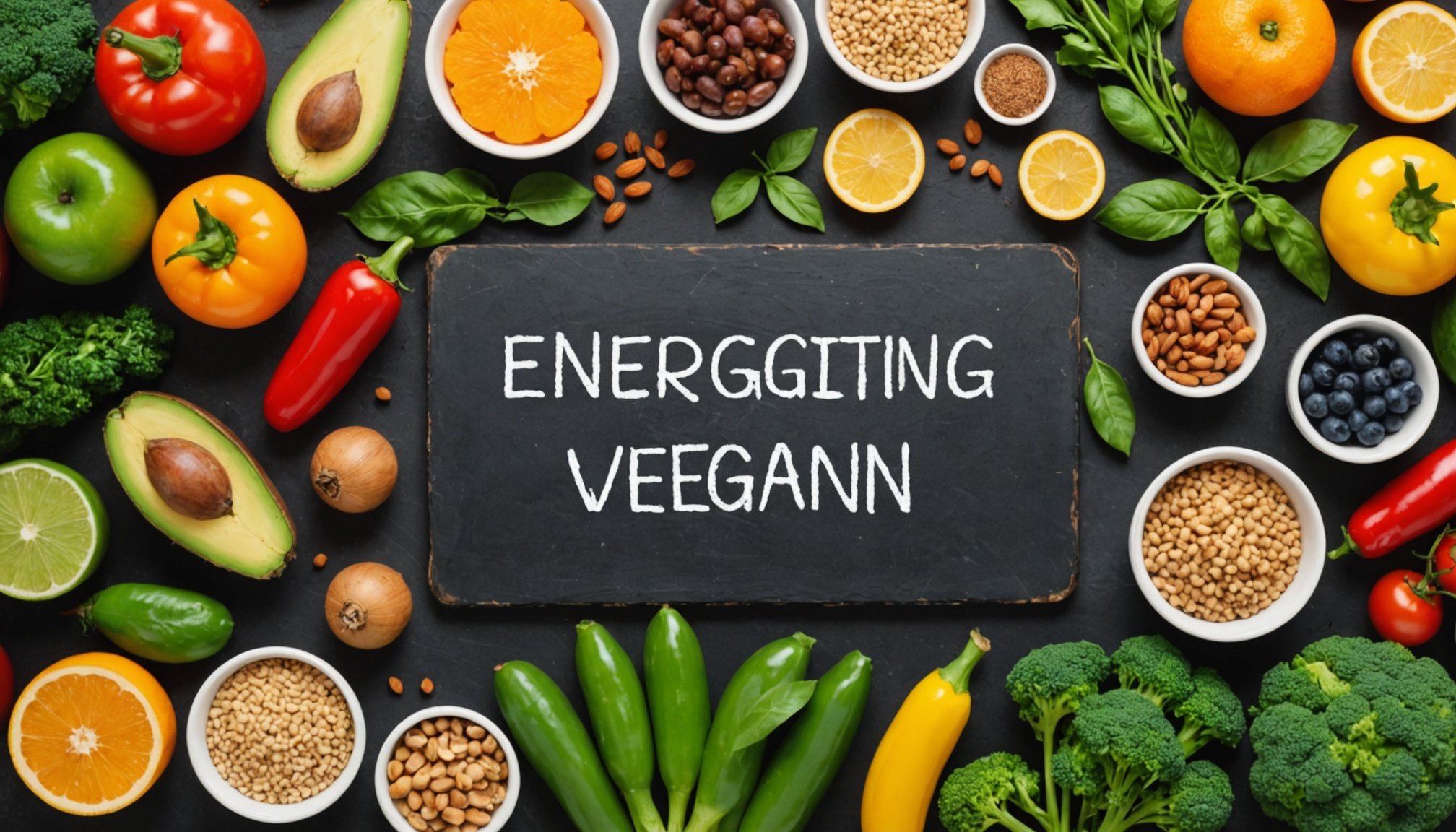Overview of Key Nutrients for Vegan Energy
Understanding the role of essential nutrients is critical for maintaining vegan energy sources, especially for those leading an active lifestyle. Ensuring adequate energy levels begins with a diet rich in nutrients pivotal to sustenance and vitality. Vegan diets, while inherently rich in fibre and antioxidants, can sometimes lack specific nutrients crucial for energy production.
Among these essential nutrients are vitamin B12, iron, and omega-3 fatty acids. Vitamin B12, mostly found in animal products, is vital for red blood cell formation and neurological function. Vegans can obtain it from fortified foods or supplements. Iron, important for oxygen transport in the blood, is abundant in plant sources like lentils and spinach, although absorption might be enhanced by consuming vitamin C-rich foods simultaneously.
Also to see : Unlock the Secret to a Radiant Glow: Top Techniques for Flawless Highlighter Application
Omega-3 fatty acids, important for heart health and reducing inflammation, can be sourced from flaxseeds and walnuts. Adopting a diet varied in these vegan energy sources ensures an adequate nutrient intake, crucial for sustaining an active and vibrant lifestyle.
Embracing a plant-based diet requires careful planning to truly harness its potential benefits while maintaining energy and overall health. Integrating these nutrients can significantly enrich a vegan lifestyle, fortifying both energy levels and overall well-being.
Topic to read : Essential Tips for Nurturing Radiant Skin Throughout Your Pregnancy Journey
Protein Sources in Vegan Diets
Incorporating ample plant-based protein into a vegan diet is crucial for maintaining energy and supporting muscle recovery. Proteins play a pivotal role in repairing tissues and are essential for a balanced diet. Fortunately, there are varied and rich vegan protein sources.
Legumes like lentils, chickpeas, and beans are excellent vegan protein sources, providing a substantial amount of protein per serving. Quinoa is another powerhouse, offering a complete protein profile, which means it contains all nine essential amino acids. Similarly, soy products, such as tofu and tempeh, are versatile and nutrient-dense, making them popular choices among vegans.
To maximise your intake, incorporate these protein sources into everyday meals. For breakfast, consider a tofu scramble or oatmeal topped with nuts. At lunch, a quinoa and black bean salad can be both fulfilling and protein-rich. Additionally, dinner can feature a hearty lentil soup or a chickpea stir-fry.
Pairing different vegan protein sources ensures you’re getting a diverse array of nutrients. Get creative with your meals to keep things enjoyable and nutritious, all the while supporting your body’s energy needs and aiding muscle recovery.
Iron and Its Role in Energy Production
Understanding the significance of iron in our bodies is vital, particularly for maintaining energy levels and facilitating red blood cell production. Iron is a crucial component of hemoglobin, enabling oxygen transport throughout the body, which ultimately supports energy production. Without adequate iron, one might experience fatigue and decreased vitality.
For those following a vegan diet, ensuring sufficient iron intake is essential. Vegan iron sources include lentils, spinach, and fortified cereals. These foods are not only accessible but are also excellent choices for meeting daily iron requirements.
However, consuming iron-rich foods is not where the story ends. One can face iron absorption issues if these foods are not combined with sources of vitamin C, which is known to enhance iron absorption. Including foods like citrus fruits, bell peppers, or strawberries in meals can improve iron uptake, effectively tackling potential deficiencies.
By strategically integrating these vegan iron sources with vitamin C-rich foods, individuals can optimise their iron levels and thus maintain robust energy levels. It’s a simple yet effective approach to supporting the body’s demanding energy and oxygen transport needs, especially within a plant-based diet.
Vitamin B12: A Vital Nutrient for Vegans
Vitamin B12 plays a crucial role in energy metabolism, which is a fundamental process for converting food into usable energy. Without adequate levels of vitamin B12, the body’s capability to produce energy efficiently diminishes. For vegans, identifying reliable Vegan B12 sources is essential, as this nutrient is predominantly found in animal products.
Plant-based sources include fortified foods like plant milks, breakfast cereals, and nutritional yeast, offering an accessible means to incorporate B12 into a vegan diet. However, due to limited natural vegan sources, relying on these foods alone might not suffice for adequate intake. Here, B12 supplementation becomes a practical approach to meet dietary needs, ensuring energy-boosting vitamins are readily available.
Understanding the signs of B12 deficiency is critical for prevention. Symptoms such as fatigue, weakness, and tingling sensations could signal inadequate B12 levels. By familiarising themselves with these indicators, vegans can take proactive measures, like consulting healthcare providers, to incorporate appropriate B12 supplementation or adjust their diets towards fortified Vegan B12 sources. This comprehensive strategy supports maintaining optimal energy levels and preventing potential health issues related to deficiency.
Omega-3 Fatty Acids for Sustained Energy
Omega-3 fatty acids play a crucial role in maintaining cognitive function and energy levels. These essential nutrients support brain health by enhancing neurotransmitter function, which is vital for sharp focus and mental clarity. The body’s energy production is also optimized through omega-3s, contributing to sustained vitality throughout the day.
For those following a vegan lifestyle or looking to diversify their nutrient intake, vegan omega-3 sources are an excellent option. Notable plant-based sources include flaxseeds, chia seeds, and walnuts. These foods are not only rich in omega-3 fatty acids but also offer additional benefits such as fibre and antioxidants.
Incorporating omega-3 into a daily diet can be straightforward and enjoyable. Enhance your meals with ground flaxseeds sprinkled over cereals or smoothies, or add chia seeds to yogurt for a nourishing treat. Walnuts also make for a convenient snack or a crunchy addition to salads. By regularly consuming these nutrient-dense foods, you can support better energy and focus, contributing to an active and balanced lifestyle.
Ensuring adequate omega-3 intake can lead to improved mental performance and optimal energy management, empowering you to navigate busy days with confidence.
Additional Nutrients Contributing to Energy Levels
Achieving optimal energy levels involves more than just the right macronutrients. Magnesium, for instance, plays a vital role in energy production and enzyme activation. Foods like nuts, seeds, and leafy greens are excellent vegan sources of magnesium, ensuring sufficient intake for those adhering to vegan diets.
Zinc is another crucial nutrient, impacting metabolism and immune function, thus indirectly influencing energy. Found in whole grains and legumes, zinc should be incorporated into daily meals to sustain vitality.
Complex carbohydrates serve as a primary energy source due to their slow-release nature. They provide a consistent supply of glucose, critical for maintaining energy throughout the day. Whole grains such as oats, whole wheat, and brown rice are prime examples, rich in both complex carbs and fibre.
For those on vegan diets, strategic meal planning is essential. It’s beneficial to create a balanced diet comprising a variety of nutrient-dense foods. Mixing different plant-based protein sources with grains and vegetables can enhance nutrient absorption and energy levels. Planning meals carefully ensures that individuals meet their nutritional needs, supporting both energy and overall health.
Meal Suggestions for Energizing Vegan Diets
Creating energizing vegan meals involves strategic planning and selecting ingredients that provide both energy and essential nutrients. Meal prep plays a pivotal role in ensuring balanced nutrition throughout the week. Here are some ideas to get you started on high-energy plant-based recipes:
-
Breakfast: Start your day with a chia seed pudding topped with fresh fruit and nuts. This combination of healthy fats, fibre, and natural sugars provides long-lasting energy.
-
Lunch: A quinoa salad with chickpeas, mixed greens, and a tahini dressing can sustain you through the afternoon. Quinoa is a complete protein and pairs well with other nutrient-dense foods.
-
Dinner: Opt for a hearty lentil and sweet potato stew. Lentils offer protein and iron, while sweet potatoes provide complex carbohydrates for energy.
To emphasize energy, incorporate meals focusing on ingredients such as oats, nuts, and leafy greens. These foods are rich in essential nutrients like magnesium and iron, vital for active lifestyles.
Consider prepping meals over the weekend so you can enjoy these dishes throughout the week. This not only saves time but helps maintain a balanced diet, ensuring you stay energized and healthy.
Addressing Common Deficiencies in Vegan Diets
Navigating a vegan diet comes with its own set of challenges, especially when it comes to maintaining nutrient balance and avoiding vegan deficiencies. Common dietary gaps can lead to energy problems, impacting daily activities and overall well-being. Identifying these deficiencies early on can prevent more significant health issues down the line.
Vegans might experience energy problems due to a lack of essential nutrients such as Vitamin B12, Iron, and Omega-3 fatty acids. Nutrient balance is crucial, as these deficiencies can manifest in feelings of fatigue, dizziness, or even anaemia. Recognising these signs early is vital for maintaining a balanced diet.
To avoid these pitfalls, a few pivotal steps can help maintain nutrient balance:
- Incorporate a diverse range of plant-based foods like legumes, nuts, and seeds.
- Consider fortified foods or supplements, especially for Vitamin B12 and Omega-3.
- Plan meals with an emphasis on nutrient-dense foods to prevent potential deficiencies.
Addressing these vegan deficiencies proactively will not only improve energy levels but also ensure long-term health. For anyone on a vegan diet, putting effort into understanding and meeting nutritional needs is a crucial step toward a healthier lifestyle.











